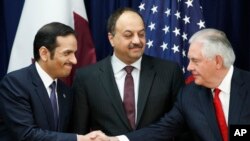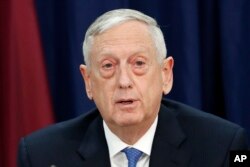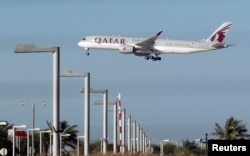The United States is urging all sides in the ongoing Gulf dispute to de-escalate tensions and work to counter terrorism as well as Iran's influence in the region.
"It's critical that all parties minimize rhetoric, exercise restraint to avoid further escalation and work toward a resolution," said U.S. Secretary of State Rex Tillerson on Tuesday.
In June 2017, Saudi Arabia, Bahrain, the United Arab Emirates (UAE) and Egypt imposed sanctions on Qatar, accusing Doha of financing extremist groups and aligning with Iran, the Gulf Arab states' rival. Qatar has denied the allegations. Saudi Arabia, Bahrain, UAE and Qatar are all members of Gulf Cooperation Council, or GCC.
Tillerson and Defense Secretary Jim Mattis co-hosted the inaugural U.S.-Qatar Strategic Dialogue with Qatari Foreign Minister Sheikh Mohammed bin Abdulrahman Al Thani and Defense Minister Khalid bin Muhammad al-Attiyah at the State Department.
Tuesday's high-level talks took place as the Gulf dispute nears its eighth month. The tensions have divided the GCC, a grouping of U.S. allies that has long served as an Arab counterbalance to Shiite Iran.
"A united GCC bolsters our effectiveness on many fronts, particularly on counterterrorism, defeating ISIS and countering the spread of Iran's malign influence," said Tillerson, using an acronym for the Islamic State terror group.
U.S.-Qatar defense ties
U.S. officials say the rift between Qatar and other Arab nations has not affected U.S. military ties with Qatar, which hosts the largest U.S. military facility in the Middle East. U.S.-led coalition aircraft bomb Islamic State targets in Syria and Iraq from Al Udeid Air Base.
"The United States enjoys a long-standing defense relationship with Qatar," said Mattis on Tuesday, calling Qatar "a strong and valued military partner" in the Middle East region.
"Even in the midst of its own current challenges, Qatar and the United States maintain excellent military-to-military relations," he added.
Last week, the Qatari air force for the first time flew two C-17 flights from the Gulf to Afghanistan to supply the NATO mission there, according to Mattis.
Strategic and commercial relations
The State Department said Washington is reaffirming its "strategic relationship" with Doha, with both agreeing to deepen security and military cooperation, as well as work together in the fight against human trafficking.
The two countries also agreed to establish a permanent and annual strategic dialogue, with the next round to be held in Doha next year.
Tuesday's talks came after U.S. authorities issued an order requiring additional screening of cargo on flights heading to the United States from Egypt, Jordan, Saudi Arabia, Qatar and the UAE.
The U.S. Transportation Security Administration said last Monday the purpose of this order was to prevent terrorist attacks in response to persistent threats to aviation.
Qatar Airways, operating out of Doha International Airport, is one of the airlines required by the U.S. authorities to provide certain information on shipments before loading cargo.






